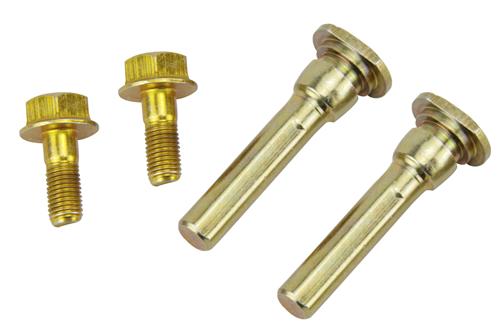

(* I tend to use a lot of Carson caliper kits for doing these kinds of jobs*) I'd typically refresh all the guide pin bushings and guide pin rubber sleeves once between 150k to 200k, and none of them have swollen on me when using Syl-glide exclusively as the sole form of guide pin lubricant. Assuming that the piston dust seal(accordian boot) is not ripped nor swollen and no piston to bore seal leaks, etc. I must tell you though: I have been servicing/rebuilding Aisin and Nissin calipers on Toy and Honda for over a decade now, and most of those single piston caliper configuration, their guide pins do come with rubber bushing on their end. While I cannot tell you precisely what the rubber sleeve is for RE: in the guide pin itself, I think you are quite close to your guessing RE: to eliminate any slop or shifting of the caliper and pad under certain braking conditions. rubber sleeve becomes swollen inside the guide pin bore. Rubber sleeve on guide pin screw seizing up is normally due to wrong type of lube used: i.e. One side of me wants to replace all of the sleeves with new ones, but who's to say this won't happen again? Picture the pin on the right with a rubber sleeve in the indent towards the bottom that's how they were originally. The one on the left is all metal per OE, and the one on the right is the pin without the sleeve, as I have it installed. Everything was relubed with brake grease safe for rubber/plastic parts, and the new brakes are working great without a peep. I noticed upon reinstallation that any slop in the pins was about the same with as without those rubber sleeves. Others seem to have had success doing this as well. My research told me that these sleeves are for (probably) sound/vibration deadening and possibly to relieve some minor slop in the movement, if any. So what I did, after some research, is remove all the rubber sleeves, period. On a 5 year old car? Insane! The rubber sleeves have either stretched, or swelled, but the grease on the pins is rubber-safe, so I don't see that being the issue. Upon close inspection, the rubber was trying to work its way up or down the pin during movement, binding everything up. What is strange is that on most of the pins that had rubber sleeves, the rubber sleeves were what was seizing the pin, not corrosion or lack of lube. The fronts have rubber sleeves on both pins. The rear has one solid metal pin, and one pin with a rubber sleeve near the bottom. As with many vehicles, this car has different slide pins in the back than in the front. Always use synthetic grease made specifically for brake caliper sliding pins and rubber boots such as sylglide, CRC brake caliper synthetic grease, Gunk syn brake grease with added molybdium, or Permatex syn lube. It had some of the weirdest pad and rotor wear I've ever seen. Never use petrolium-based (lithium or not doesnt matter) grease in caliper sliding pins. During the process, I found it disturbing that more than half of the slide pins were nearly seized! Now, this car is less than 5 years old and has 51,000 miles on it. So yesterday I finished replacing all rotors and pads on the Fusion.


 0 kommentar(er)
0 kommentar(er)
